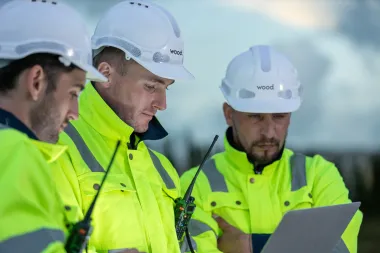
Press release
Wood secures contract extension across key assets in the Southern North Sea
As world-leading consultants and engineers, we are helping our clients deliver critical solutions, navigate global policy changes and deliver impactful solutions. We will be driving these conversations and sharing our industry expertise at Gastech, the largest energy exhibition and conference for natural gas, liquefied natural gas (LNG), hydrogen, climate technologies and artificial intelligence (AI), energy manufacturing and low carbon solutions.
Join us on stand G121 to find out how we can help solve your most complex engineering challenges.
Hear from the innovative minds, data driven professionals and technical experts who are driving the future of energy for our clients.
Capital projects in energy face a 65% failure rate, with operational problems persisting years after startup eroding NPV by ~31% on average. Our analysis of project data reveals six interconnected failure drivers: People & Organisation (26%), Technical Challenges (23%), Governance (18%), External Stakeholders (14%), Contracting & Procurement (13%), and Project Management Processes (9%). Digital technology and AI offer quantifiable solutions—reducing cost estimation time by 40%, improving accuracy by 30%, and cutting engineering effort by 10-20%. Success requires combining disciplined project fundamentals with aggressive digital & AI adoption.
Speaker:
Peter Carydias, Partner, Strategic Advisory
Ship-based transport of liquid CO2 to sequestration sites offers advantages where direct dense phase pipeline transport from a capture site is either infeasible or uneconomic. However, CO2 from many different types of capture processes carry many different impurities. Impurities in the CO2 being captured such as hydrogen, oxygen, water and nitrogen present safety, operational and economic challenges to the liquefaction and storage process which otherwise would not be an issue for pipeline transport. Several purification steps may be required for the CO2 prior to liquefaction and may impact the choice of technology that would be considered for liquefaction. Appropriate selection of purification and liquefaction technologies including consolidation of pretreatment steps is needed to avoid excessive costs and provide safe operation for production of liquid CO2.
Speaker:
John Woods, Principle Consultant, Consulting
Unlocking supply chain bottlenecks According to McKinsey, over ten projects, representing 100 million tons per annum of LNG capacity, reached final investment decisions in 2023 and 2024. However, rising labour costs, the need to decarbonise the gas value chain, regulatory delays, resource shortages, complex environmental approvals, and infrastructure challenges - particularly in remote locations - are all contributing to cost overruns and project delays. In this highly competitive market projects yet to reach FID may need to reassess their strategies, while those that have, must enhance their capabilities to stay on schedule and prevent cost escalation. What key strategies and innovations are projects adopting to reduce risks, balance costs, and ensure operational readiness during the development phases, while managing regulatory hurdles and the high costs of capital, equipment, and technology? Additionally, what is needed to accelerate LNG projects to support energy security while enabling sustainability.
Speaker:
Azad Hessamodini, Executive President Consulting
Recovery of cold energy at import terminals from the regasification of Liquefied Natural Gas (LNG) has attracted attention over the past decade due to the growth of the LNG trade market and increasing focus on energy efficiency. More recently focus has expanded the concept of utilising the cold energy available to liquify CO2 for export as part of a wider Carbon Capture and Storage (CCS) value chain enabling large scale decarbonisation of local Industries that do not have direct access to a sequestration pipeline connected to a CO2 store.
Speaker: Matthew Buckley, Lead Consultant